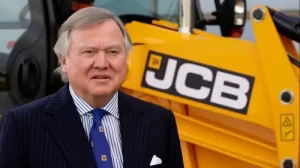Lord Bamford and his family have pocketed a £300m windfall from their JCB business empire, following a robust year for the construction equipment manufacturer that saw profits surge by 44% to £805m in 2023, according to the latest accounts.
This substantial dividend payment was approved by Bamford in late May, shortly after the recent general election that ushered in a Labour government. With the Budget set for release next week, speculation is growing around potential tax reforms targeting the UK’s wealthiest, as Labour aims to shift the tax burden. Sir Keir Starmer has indicated a policy focus on ensuring “those with the broadest shoulders bear the heavier burden,” suggesting that changes to capital gains and property taxes could be on the table.
Labour’s plans include a commitment to freeze taxes for “working people” – specifically excluding those who hold significant investments, such as shares or second homes. This policy direction has sparked concerns among Britain’s affluent families and business owners about a possible wealth tax.
Lord Bamford, one of Britain’s most notable industrialists and a well-known supporter of Brexit, has long been a substantial donor to the Conservative Party, supporting former prime ministers including David Cameron, Boris Johnson, and Liz Truss. JCB, the Staffordshire-based manufacturing giant, remains wholly owned by the Bamford family, who are now among the wealthiest in Britain with an estimated fortune of £5.9bn.
The Bamford family has a long-standing tradition of entrepreneurship: Lady Bamford founded the Daylesford Organic farm shop chain, while Jo Bamford, their son, owns the bus company Wrightbus. Since inheriting JCB from his father, company founder Joseph Cyril Bamford, Lord Bamford has expanded the business into a global player with a popular product lineup that includes the iconic 3CX Sitemaster backhoe loader, rivalling American giants Caterpillar and John Deere.
As Labour’s Chancellor Rachel Reeves faces mounting pressure from within her party to introduce a “wealth tax,” some MPs are calling for a 2% levy on individuals with assets exceeding £10m. Critics, however, argue that such a policy could deter investment and stifle entrepreneurial growth, potentially pushing high-value businesses and individuals away from the UK.
The recent £300m dividend payout to the Bamford family came through JCB Services Ltd, the main division of the group, after raising its dividend to £6,159 per share, up from £5,312. Despite this strong financial performance, JCB is bracing for a downturn in the coming year. Recent reports indicate that JCB has already made cuts of over 230 UK-based agency jobs due to lower-than-expected global demand for manufacturing.
JCB’s chief executive, Graeme Macdonald, offered a cautious outlook for 2024, citing challenges in the UK and European markets, particularly a contraction in housebuilding and a decline in Germany’s economic activity. With the manufacturing sector under pressure, JCB and similar companies may face an uphill battle in the months to come.
Read more:
Lord Bamford’s £300m family windfall from JCB raises questions amid potential wealth tax







